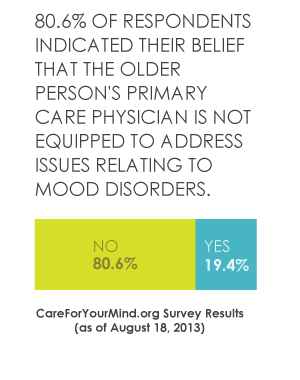 In connection with our post, “Older Adults Need Specialized Mental Health Care” on July 2, we asked readers to answer a brief survey about mental health care for older people.
In connection with our post, “Older Adults Need Specialized Mental Health Care” on July 2, we asked readers to answer a brief survey about mental health care for older people.
We figured it was a good time to bring you the results so far, and to invite you to participate in the survey.
Of all of the results, there were two items of particular interest to us at CFYM.
64.5% of respondents indicated that they know an older person who they believe has a mood disorder but who is not diagnosed or treated. We are hopeful that changes in care under the Affordable Care Act will help to remedy that deficiency, but it’s likely that it will take more than changes in the law. Many older adults will have to reconsider their perceptions of mental health, as well as their expectations of maintaining mental wellness and happiness during their later years. Also, their physicians need to learn more about the special mental health care needs of older adults.
What else will help reduce the number of older adults who are likely living with a mood disorder but who are not diagnosed or treated?
A startling 80.6% of respondents indicated their belief that the older person’s primary care physician is not equipped to address issues relating to mood disorders. Our health care system highly values the relationship between patient and primary care provider, and people who are not dealing with any specialized health needs rely on their PCP to tend to the entirety of their health care needs. The overwhelming perception that PCPs are ill-equipped to address mental health needs (particularly mood disorders) raises significant concerns.
Are PCPs more able to manage mental health care than consumers expect, or is there a real need for PCPs to be better trained on mental health care, for mental health care services to be more readily available from other providers, or a combination of these – or something else entirely? Will integrative care help to overcome this perceived deficiency?
Here are the results. Tell us what you think!









Connect With Us